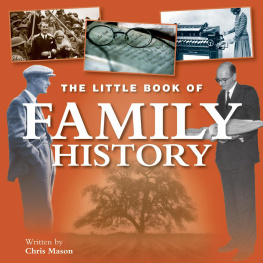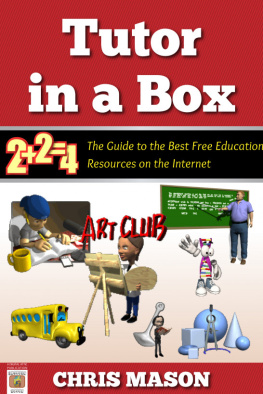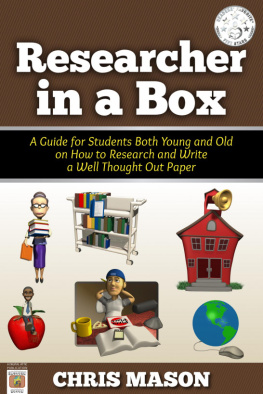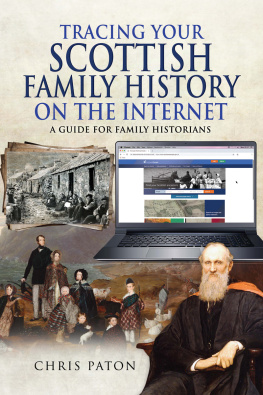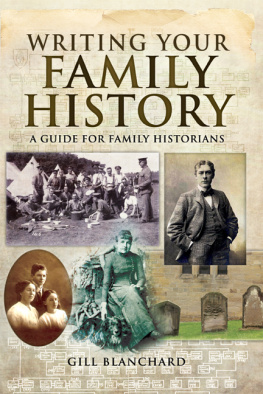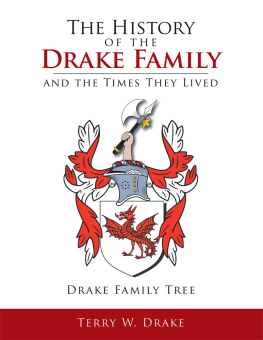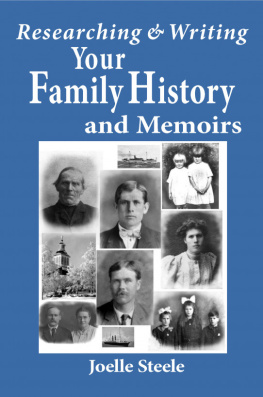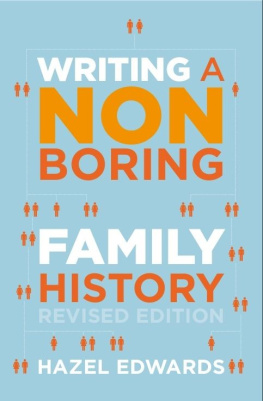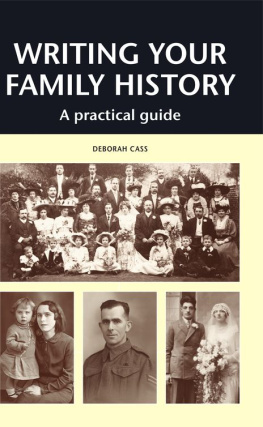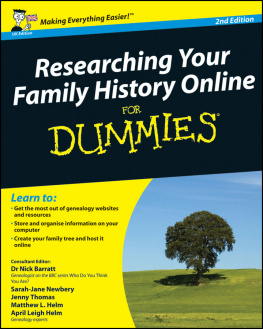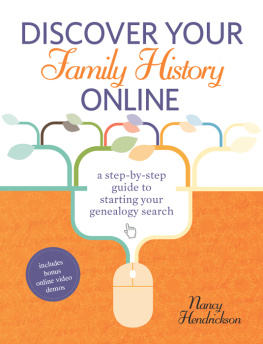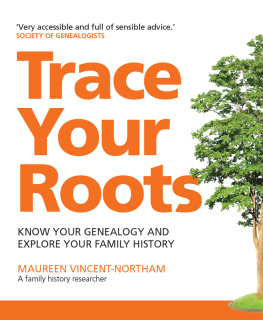Chapter 1: Introduction
Why do people want to start delving into the history of their own family? Its probably got a lot to do with wanting to know why we are the way we are and where certain traits in our own character come from. Whatever the reason, almost everyone who investigates their family tree soon finds that the whole business, while it can at times be a little frustrating, is nevertheless extremely fascinating. Many people do not start to take an interest in their roots until they are getting on in years but, increasingly, younger people many of whom naturally have access to computers are also becoming involved.
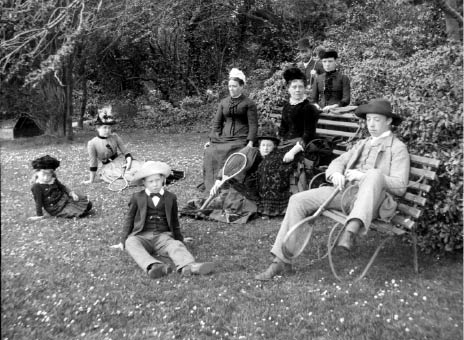
*A Victorian family at leisure.
Whether you are young, old, or somewhere in between, if you are considering investigating your family history, then the best advice is to make a start as soon as possible. Your ageing relatives will not live forever and if you dont ask them questions about their childhood and their own parents and grandparents, their memoriets are likely to die with them. Most of us have regrets about not asking enough questions before it became too late.
Of course, people have always been interested in the history of their own families and have always asked questions of their relatives. In times past however, more detailed research was not all that easy. For one thing, the material was often widely scattered and not easy to locate. For another, so-called ordinary people had neither the time, the money, nor perhaps the education to delve very deeply into the life and times of their ancestors. Many people knew, or believed they knew, about their antecedents, but family history was largely a matter of oral tradition, with stories handed down from generation to generation. In some communities this is, of course, still the case.
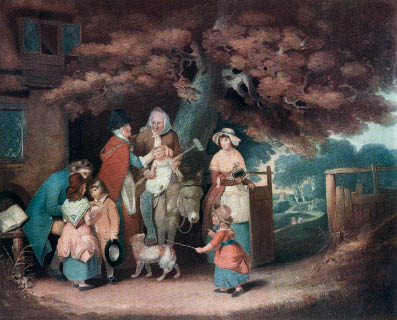
*Several generations of a family on their way to church.
Further research could normally only be undertaken by those with the time and financial resources to undertake it. Elderly vicars from good families might spend years trawling through the various records and they often had old family papers to help them. While those middle or upper class amateur genealogists often did sterling work, they tended to look only on the bright side of their families. Every family has its black sheep people who refuse to conform to the moral climate of the day but the perceived dirty deeds of the black sheep were largely ignored by earlier generations of family historians. They preferred instead to concentrate on those who had toed the line and maintained the honour of the family, followed their forebears into one of the respectable professions, or generally bettered themselves.
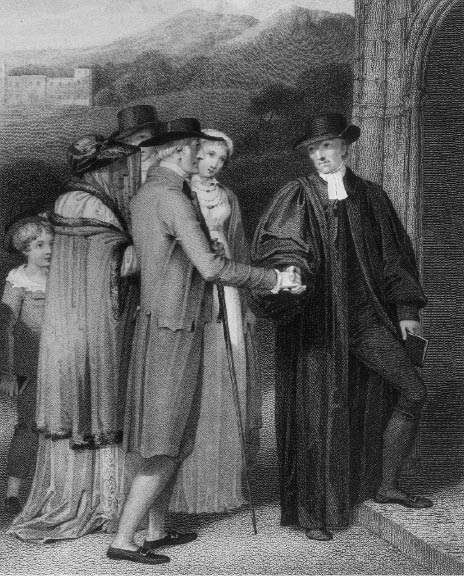
*A parson with members of the congregation.
Early family historians would sometimes behave like historians in the former Soviet Union, by either completely ignoring someones existence, or by simply making a vague passing reference to them. Women who gave birth out of wedlock would be subjected to such treatment as, during their lifetime, they would have been very much despised. Such women were considered to be no good or a bad lot and their offspring would be ignored by the rest of the family. Mind you, if a young gentleman got a household servant into trouble that was deemed rather more acceptable. More acceptable, perhaps, but not to be written or talked about.
Things are of course very different today. Attitudes have largely changed and, with far more resources available to everyone, researching the history of ones family is a lot easier. It is no longer the exclusive province of the middle classes or the idle rich and most of us will be more than happy to discover the previous existence of the odd black sheep or fallen woman. Research can however still be very time-consuming and you will, from time to time, come up against a brick wall. A lot will depend on just how much time you have available and on how far back you wish to go. When you start out, however, you will probably make quite a bit of progress in a fairly short period.

*Jeremy Paxman featured in the popular BBC 2 series.
The hobby of tracing ones family history has increased in popularity to a quite remarkable extent in recent years. This increased popularity is reflected in the amount of television time now devoted to the subject. Family history seems to be taking over from gardening, cooking, moving house and buying and selling antiques and collectibles. Our so-called celebrities are now in on the act and their reactions to finding out about their ancestors can be quite fascinating. Early in 2006, in the B.B.C. series Who Do You Think You Are? notorious softie Jeremy Paxman was almost reduced to tears on learning about the poverty and deprivation suffered by some of his forebears. When asked at the beginning of the programme if he was excited by the thought of delving into his familys past, he had replied that it was a stupid question; of course he wasnt excited. Interested, yes but not excited. He seemed to feel differently half an hour or so later.
If only we all had a team of researchers employed by the B.B.C. to do the work for us. On the other hand, that would take a lot of the fun out of it. Sorry, Mr. Paxman, but as you now know, it really can be fun as well as, at times, emotionally exhausting. Many of us will find that we have paupers, rogues and even outright criminals in our family tree. Most of us wont find members of the aristocracy hanging from a lofty branch, but we are all likely to discover people from more than one social class amongst our ancestors and it is this mix of people, their living conditions and their occupations, which can make it all so fascinating. As Stephen Fry said in another edition of Who Do You Think You Are? It makes you realise how intimately interwoven with history we are.

*Stephen Fry who took part in the BBC series Who Do You Think You Are.
There is an amazing amount of archive material relating to individuals of the past. The trick is to know how and where to find it. Much information is now available in computerised form and access to a computer will help significantly although primary sources should always be chetcked, as computerised records are prone to errors. It is of course perfectly possible to investigate your family history without the aid of a computer. Record offices still have large numbers of hand-written and typed documents: it will take years to computerise everything and some of it may never be done.
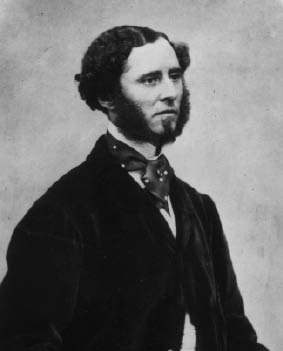
*Beards were very popular a hundred years ago.
The purpose of this book is to act as a starting point for family history research. It does not pretend to be a comprehensive guide, but it does hopefully contain enough information to set you on your way. Towards the end you will find lists of addresses and websites referred to in the text.
Good luck with your investigations!

